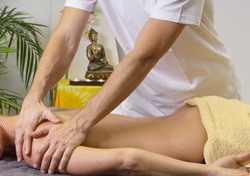How to Pick the Right Massage Therapist Degree Program near Halifax North Carolina
 Choosing the right massage therapy school near Halifax NC is an important first step to beginning a rewarding first or second career as a massage therapist. After all, who wouldn’t want to work in an occupation where the sole purpose is to help people feel and function better? Massage therapists can work in a wide variety of locations, including hospitals, day spas, health clubs and even aboard cruise ships! But before starting a career in this specialty of holistic healthcare, receiving the proper training and licensing is a must. And keep in mind that not all massage therapy programs are alike. When making your evaluations, it’s important that you look at all aspects of the schools you are considering and not just the cost or convenience of the locations. We will provide some basic tips that you should incorporate into your due diligence process when selecting a massage therapist school.
Choosing the right massage therapy school near Halifax NC is an important first step to beginning a rewarding first or second career as a massage therapist. After all, who wouldn’t want to work in an occupation where the sole purpose is to help people feel and function better? Massage therapists can work in a wide variety of locations, including hospitals, day spas, health clubs and even aboard cruise ships! But before starting a career in this specialty of holistic healthcare, receiving the proper training and licensing is a must. And keep in mind that not all massage therapy programs are alike. When making your evaluations, it’s important that you look at all aspects of the schools you are considering and not just the cost or convenience of the locations. We will provide some basic tips that you should incorporate into your due diligence process when selecting a massage therapist school.
What is Massage Therapy?
 As mentioned in the introduction, massage therapy is a holistic form of healthcare in Halifax NC that helps people feel and function better. The massage therapist manipulates skin, muscles and tissue to reduce stress and relieve tension and pain in their patients. Swedish, or Classic Massage, is the type of massage that most people think of when discussing massage therapy, and most massage therapy schools teach it as their primary form of massage. However, there are many other types of massage that programs may or may not include within their course of instruction. Following are just a few examples.
As mentioned in the introduction, massage therapy is a holistic form of healthcare in Halifax NC that helps people feel and function better. The massage therapist manipulates skin, muscles and tissue to reduce stress and relieve tension and pain in their patients. Swedish, or Classic Massage, is the type of massage that most people think of when discussing massage therapy, and most massage therapy schools teach it as their primary form of massage. However, there are many other types of massage that programs may or may not include within their course of instruction. Following are just a few examples.
- Neuromuscular Therapy Massage
- Deep Tissue Massage
- Sports Massage
- Shiatsu Massage
- Thai Massage
- Hot Stone Massage
- Pregnancy Massage
Professionals that work in massage therapy in Halifax NC should be referred to as massage therapists. From time to time one may hear them called a masseuse or a masseur, which refers to a female or a male massage practitioner. However, these terms generally carry a negative connotation among the general public and professionals alike and should be avoided.
Massage Therapist Education Requirements
 Most schools offering massage therapy require that the enrollee have a high school diploma or its equivalent to qualify. Programs can range in length from several months for a Certificate or a Diploma to as long as two years for an Associate’s Degree. The lengths of the programs will also vary by State based on the number of hours required for licensing. Another factor that may also influence the program length is whether classes are offered in Halifax NC during the day or in the evening. Also, an Associate Degree in Massage Therapy may have general education requirements and are often transferable into a related Bachelor’s Degree Program. Once you have received your Certificate or Degree, the education does not end there. The amount and type of continuing education you will need to complete will depend on the State where you are licensed. Some states require both a certain number of hours of continuing education as well as specific education in subjects such as HIPAA compliance or ethics.
Most schools offering massage therapy require that the enrollee have a high school diploma or its equivalent to qualify. Programs can range in length from several months for a Certificate or a Diploma to as long as two years for an Associate’s Degree. The lengths of the programs will also vary by State based on the number of hours required for licensing. Another factor that may also influence the program length is whether classes are offered in Halifax NC during the day or in the evening. Also, an Associate Degree in Massage Therapy may have general education requirements and are often transferable into a related Bachelor’s Degree Program. Once you have received your Certificate or Degree, the education does not end there. The amount and type of continuing education you will need to complete will depend on the State where you are licensed. Some states require both a certain number of hours of continuing education as well as specific education in subjects such as HIPAA compliance or ethics.
Massage Therapist Licensing
Once you have graduated from an accredited massage therapy school, you will then need to become licensed in the State where you will be practicing. The Massage & Bodywork Licensing Examination (MBLEx), is a test controlled and administered by the Federation of State Massage Therapy Boards (FSMTB) and is required by most States as part of the licensing process. Some States have their own or additional exams, so check with your State prior to enrolling in a massage therapy program. If you do not pass the MBLEx in the first attempt, you can take it again after 30 days but must pay an additional exam fee. Once licensed, you will need to maintain it in most states, which means paying a renewal fee and satisfying renewal requirements. As previously mentioned, renewal typically requires a certain number of hours of continuing education be completed. And if you should move to another State, you will need to get licensed in that new State as well. Every State regulates massage therapy differently, so it is not safe to assume that you will automatically qualify for licensing. Check with your new State before moving to confirm that you meet the requirements to legally practice there.
What to Ask Massage Therapy Courses
 Before you select a massage therapist school, there are some important questions that you need to ask about the programs you are considering. As previously mentioned, the location of the school is important, particularly if you will be commuting to classes from Halifax NC. And of course the total cost, including tuition, books and all training materials will also be an important factor. But beyond those basic qualifications, following are some questions you should ask so that you have all of the facts before picking a massage therapist degree program.
Before you select a massage therapist school, there are some important questions that you need to ask about the programs you are considering. As previously mentioned, the location of the school is important, particularly if you will be commuting to classes from Halifax NC. And of course the total cost, including tuition, books and all training materials will also be an important factor. But beyond those basic qualifications, following are some questions you should ask so that you have all of the facts before picking a massage therapist degree program.
- Is the School Accredited? Accreditation may be required for licensing as well as student loans or financial aid. It also helps to ensure that the program meets acceptable levels of quality. Some Halifax NC employers also prefer job candidates from accredited schools.
- Does their Curriculum Comply with EALP Standards? Entry-Level Analysis Project (EALP) standards were created by an association of massage organizations to define minimum standards for preparing massage school graduates for entry-level professional work.
- What Massage Therapy Programs are Available? Find out if the type of program you are interested in is available, such as an Associate Degree in Massage Therapy. Also, if you need to attend evening classes near Halifax NC make sure that they are offered as well.
- What Types of Massage Therapy are Taught? As previously mentioned, most massage therapy schools teach Swedish Massage. However, the better programs include multiple types of massage therapy. Make sure that the program you choose includes those you are most interested in.
- Is Financial Aid Available? To qualify for federal financial aid or a student loan, the school will need to be accredited by a national accrediting organization. Find out from the schools you are considering what they offer in aid or if they assist students in obtaining funding from other sources.
- How Long has the School Existed? One indication that a school provides a quality education is longevity. However, all schools had to start from day one, and many fine schools are relatively new. So use this as one of several qualifications when comparing schools.
- Does the School have a Job Placement Program? Find out if the schools have job placement programs and what their placement rates are. Ask if they assist with such skills as how to interview for a position and how to prepare a resume.
- Is Plenty of Hands-On Training Provided? This includes classroom training as well as placement in internship programs. The best massage therapy schools make sure that students have plenty of time to practice what they learn so they can develop their skills and be corrected when necessary.
- What is the Background of the Faculty? Find out what the experience and credentials are of the teaching faculty. Speaking with schools’ faculty in person can also provide valuable information. Before applying, arrange to take a tour of the school and talk with staff members and students if permissible. Schools may also have Open House events for prospective students.
Enrolling in a Massage Therapy School Near Halifax NC?
Perhaps you live near Halifax North Carolina or will commute to a massage therapist degree program in that area. Either way, you may find the following background information about the location of your new school campus both interesting and informative.
Halifax County, North Carolina
Halifax County is located in North Carolina's Coastal Plain region. The geography and history of the county were shaped by the Roanoke River, which forms its northern boundary. According to Preservation North Carolina, “Halifax County, designated in 1759, is one of the oldest counties in North Carolina with a rich history dating back to the earliest days of European settlement of North America. Over the years, Halifax County has provided North Carolina with more leaders – governors, congressmen, generals – than any other county in the state.”
Originally the area was home to Tuscarora Indians and then it was settled in the early 18th century by English colonists migrating south from Virginia and also from New Jersey. The town of Halifax developed along the banks of the Roanoke River and established itself as the trading center for goods passing from settlement to settlement. The Roanoke River played a major role in the county’s development, so much so that Halifax County was even considered as a potential capital of North Carolina. It remained a prosperous county until the railroads usurped the river as the major form of transportation. After Halifax County separated from Edgecombe County, the town of Halifax became the county seat (Enfield was the original county seat when Halifax was part of Edgecombe County). All territory within the boundaries of Edgecombe County north of Fishing Creek and Rainbow Banks on the Roanoke River (approximately 711 square miles) was officially designated as Halifax County on January 1, 1759. The current Halifax County towns include Enfield, Hobgood, Littleton, Roanoke Rapids, Scotland Neck and Weldon.
Besides having 40 sites on the National Register of Historic Places, Halilfax County is also historically significant because of two events preceding the American Revolution. John Lord Carteret, the second Earl Granville, inherited a one-eighth share of Carolina territory originally granted to Sir George Carteret by the British Crown. The second Earl Granville administered the district (an area between the present Virginia-North Carolina border and a line about 65 miles south) from across the Atlantic, but there was little oversight and the land agents he put in charge of granting land, collecting rent and surveying for settlers – Edward Moseley, Francis Corbin and Thomas Child – were often accused of malfeasance by settlers and landowners.
Select the Right Massage Therapist Program near Halifax NC
Good luck as you embark on your journey to begin a career as a professional massage therapist. As with all things worth achieving, it will take a lot of hard work and dedication to succeed. You originally came to this website because of your interest in Accredited Massage Therapy Programs. However, by following the suggestions contained within this article, you will have an excellent opportunity for success by picking the right massage therapist school. And with the right education you will soon become a professional massage therapist servicing the Halifax North Carolina area.
More Therapeutic Locations in North Carolina


